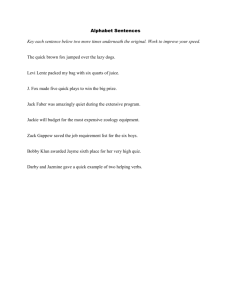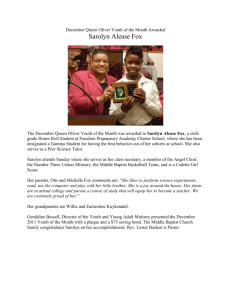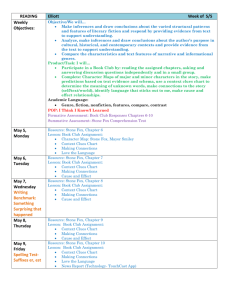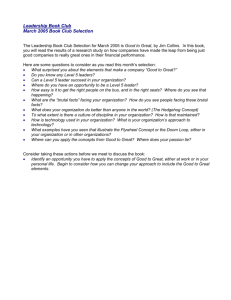AST Q&A meeting with Tom Fox and Angus
advertisement
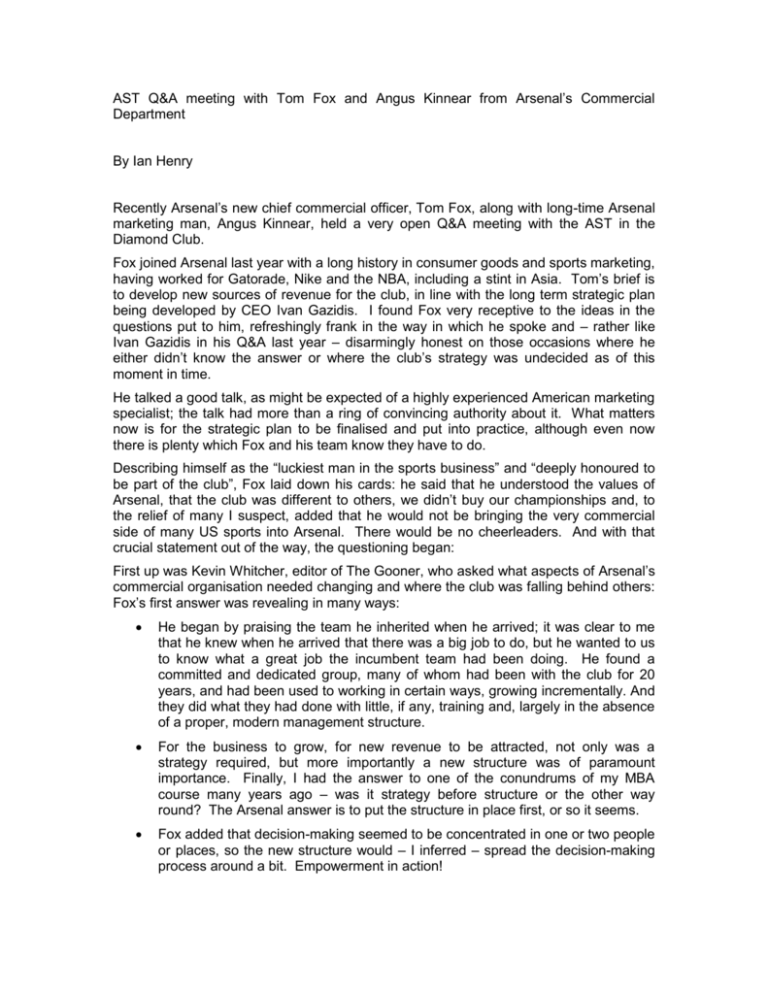
AST Q&A meeting with Tom Fox and Angus Kinnear from Arsenal’s Commercial Department By Ian Henry Recently Arsenal’s new chief commercial officer, Tom Fox, along with long-time Arsenal marketing man, Angus Kinnear, held a very open Q&A meeting with the AST in the Diamond Club. Fox joined Arsenal last year with a long history in consumer goods and sports marketing, having worked for Gatorade, Nike and the NBA, including a stint in Asia. Tom’s brief is to develop new sources of revenue for the club, in line with the long term strategic plan being developed by CEO Ivan Gazidis. I found Fox very receptive to the ideas in the questions put to him, refreshingly frank in the way in which he spoke and – rather like Ivan Gazidis in his Q&A last year – disarmingly honest on those occasions where he either didn’t know the answer or where the club’s strategy was undecided as of this moment in time. He talked a good talk, as might be expected of a highly experienced American marketing specialist; the talk had more than a ring of convincing authority about it. What matters now is for the strategic plan to be finalised and put into practice, although even now there is plenty which Fox and his team know they have to do. Describing himself as the “luckiest man in the sports business” and “deeply honoured to be part of the club”, Fox laid down his cards: he said that he understood the values of Arsenal, that the club was different to others, we didn’t buy our championships and, to the relief of many I suspect, added that he would not be bringing the very commercial side of many US sports into Arsenal. There would be no cheerleaders. And with that crucial statement out of the way, the questioning began: First up was Kevin Whitcher, editor of The Gooner, who asked what aspects of Arsenal’s commercial organisation needed changing and where the club was falling behind others: Fox’s first answer was revealing in many ways: He began by praising the team he inherited when he arrived; it was clear to me that he knew when he arrived that there was a big job to do, but he wanted to us to know what a great job the incumbent team had been doing. He found a committed and dedicated group, many of whom had been with the club for 20 years, and had been used to working in certain ways, growing incrementally. And they did what they had done with little, if any, training and, largely in the absence of a proper, modern management structure. For the business to grow, for new revenue to be attracted, not only was a strategy required, but more importantly a new structure was of paramount importance. Finally, I had the answer to one of the conundrums of my MBA course many years ago – was it strategy before structure or the other way round? The Arsenal answer is to put the structure in place first, or so it seems. Fox added that decision-making seemed to be concentrated in one or two people or places, so the new structure would – I inferred – spread the decision-making process around a bit. Empowerment in action! And why was all this necessary? Because – we were told later – the strategy was to reduce the dependence on match day income and unlock value in different ways. Management terminology was flowing, and convincingly so. Incidentally, the word franchise was not mentioned until 30 minutes into the 90-plus minute session. Before I had time to wonder what Fox meant by unlocking value, he explained it: it wasn’t just selling our LED screens’ advertising space at higher prices – no, the club would target global rather than national advertisers (because of the TV audiences) and charge them higher prices. And re: the middle tier of seating, Fox will be speaking to premium ticketing and hospitality specialists to find new ways of delivering to the Club, Box and Diamond customers. Later on in the session, Fox debunked the idea that Club and Box tickets paid for the running costs of the team or a high proportion of these costs; no, according to Fox, these represent less than one-third of match day revenue, and therefore less than one-sixth of the club’s total revenue; important yes, critical no – important indeed, and with more potential to exploit. Angus Kinnear added an important perspective too: until recently, so much effort had gone into making the move from Highbury to the new stadium and settling into our new home that wider commercial opportunities had indeed been ignored, or if not ignored, then put on the back burner. They were no longer on the back burner; they had come to the front – and Kinnear added, intriguingly, when Arsenal’s commercial operation started to benchmark themselves against the commercial operations of other teams, they found out how lean they were, how thin they were. Someone doing the Junior Gunners role was also working on corporate accounts, while someone working on international marketing was also working on the membership scheme. There was a pride in getting the job done with the minimum expenditure – I mused on the similarity with the football team itself, and then took heart from the implicit understanding that now everyone had a clear focus on what they were doing and appropriate resources were being allocated to the tasks in hand. I was just thinking whether this approach would be adopted in the first team and hoping that we might have an experienced, world-class goalkeeper to manage the clean sheet side of the football operation, when the next question arrived: “what are the unexploited sources of revenue that the club will go after?” The first answer was sponsorship; Fox was clear, the club lagged its competitors in terms of what we brought in through sponsorship. We all know that the shirt and stadium naming deals were done when we needed the cash to help fund the new stadium and maybe they were as good as we could get at the time; there’s no point in going over that now and Fox was clear that to increase sponsorship income, a new way of thinking was required. He was also clear that the club had not done as well as it could have in getting its message across to would-be sponsors. Coming to Arsenal with a fresh set of eyes and steeped in the harsh commercial world of global sports marketing, Fox told us what we knew – that we are The London team, in the largest city in Europe and this had to count for something with sponsors. Of course we as fans have always known we are The London team, but his point is that this had not really been communicated to global sponsors and the traditional values of Arsenal, and the quality of play of the current team had also not been exploited to the maximum in sponsorship terms. I am not quite sure I understood how all of this – and the fact that most of our young squad is tied down on long contracts – was going to generate higher sponsorship, but I did come away from the meeting thinking that Fox and his team were going to have a damn good go at raising additional revenue through this route. Later on he told us how Arsenal had just recruited one of the brightest sponsorship recruitment people from London 2012, someone who had signed up £200mn for the London Olympics. That will do for me, although I still doubt we will see David Villa at the club next season. Still I will dream. However, Fox was keen to emphasise that whatever Arsenal did in this new, commercial era would be consistent with the values and tradition of the club. We won’t be brash, we will be stylish and classy seemed to be the message. Easy to say, harder to do, but I’ll give Fox and his team time to put the plan into action before allowing my scepticism to come to the surface. And what other new sources of revenue were there? Fox was sure there was more to be done through better licensing and merchandising (later he spoke of Arsenal shops around London and the possibility of shared Premier League shops in Beijing), but long term his view of the best revenue generating opportunity was from new media, especially live rights through internet TV. He told us that Premier League arrangements currently give us – and other clubs – limited control over broadcast revenues, citing how Barcelona and Real Madrid negotiated their own TV deals. On the one hand he was envious of the Spanish giants’ independence (or so it seemed to me), but intriguingly he was very much in favour of the collaborative approach of Premier League, so I was somewhat unsure how the new broadcast media route would really open up new revenue streams for Arsenal specifically. Angus Kinnear chipped in here too: the club would be looking to engage more and more with supporters outside the North London/Home Counties area; we have many fans elsewhere in the UK and abroad, and offering them a better deal was seen as a crucial. There was little real detail as to what this would entail, but we did get told on more than one occasion that the club was not looking to increase match day revenue especially from the general admission ranks. Questioning continued about whether selling a 50% stake in Arsenal Broadband was a lost business opportunity or not – Fox said not really because it would not include live rights and this is where the big revenue opportunity would come from, so the questioning moved on to the vexed issue of shirts and shirt colours. Would we have shirts with white sleeves next season? Someone said something along the lines of their being unique to Arsenal and another added how our current kit was too like Charlton Athletic’s. And, unsurprisingly, the blue away shirt came in for criticism, although Angus Kinnear assured us that the blue shirt outsold the yellow away shirts. We were told what a great deal of research Nike did into our collective shirt buying habits and our relationship with Arsenal (if anyone reading this has taken part in Nike's research, please tell us about it!) – Fox also added that until recently Arsenal hadn’t “engaged” with Nike as well as it could or should have done, but we were doing so now. They didn’t say so overtly, but I got the feeling we would have proper Arsenal shirts next season, with white sleeves. Talk of Arsenal’s core visual brand attributes led onto the vexed subject of the club crest; the questioner observed how it was booed when it was first displayed at Highbury and asked if we could or would go back to something more traditional. Fox’s response was that he didn’t have a definite view and while he came from a background where regular changes to packaging and the visual aspects of the “product” were part and parcel of business life, he would take time to consider what to do here. He made it clear that any changes to the crest would be done after very careful consideration – he was clear that the crest embodied the club and we as the fans identified with it. The club wouldn’t change it just to sell more shirts. Talking of tradition, the next question concerned the club’s tradition of not touring in the pre-season. Would this change? Would we tour to the Far East or North America? No, this would not happen soon and would only happen when the club’s strategy for these regions was in place and it was felt that the club could exploit the benefits of touring. Going to China to earn a couple of million pounds was not worth the effort, apparently; Fox added that he doubted he could convince Arsene Wenger that the club was ready to exploit the benefits of touring in a commercial sense, so he would not feel comfortable approaching the manager with this idea. So there will be no club tour to Asia in 2010. But what about 2011, once the Boston Consulting Group have finished their work and Fox and Gazidis have put their long term plan into action? Maybe. Myself, I would expect Arsenal to tour somewhere long distance in 2012, feeding off the benefits from London 2012. I then asked if the club would adopt the Carling Cup ticket approach for the FA Cup, given the success of the Carling Cup approach in bringing in otherwise disenfranchised supporters to see the team and indeed the manager’s somewhat cavalier approach to team selection for the venerable competition in recent years. Angus Kinnear said the club knew it had to find ways to bring in new supporters and Tom Fox was keen to add that they did not intend to increase prices – he said: “we spend more time on discussing how to give the fans more value for their match day experience than on raising prices” – or words very close to that anyway! Maybe next season there will be an opt out for the FA Cup for season ticket holders. Personally, I doubt this will really make much difference to the attendance profile – the Ticket Exchange system for season tickets is an unwieldy service. If the aim is to get new, different people into the stadium, then making more tickets available to red members or even on general sale is the only way. Watch this space – I got the feeling that the club knew that they had to do something here and were considering their strategy carefully. The questioning then went back to the international dimension and the opportunities open to the club, especially in the Far East. Fox was in his element here, having worked for the NBA in Hong Kong, taking the NBA into China. He quoted some interesting stats: In 1995, when Nike had been in China for 10 years it had a turnover in the country of just $40m; in 2002 it was just $80m, so for around 18 years it hadn’t even covered its costs. Five years later in 2007, Nike’s turnover in China was $800m and is now over $1bn; the message was clear – it’s tough and it is hard to build a meaningful business in China, and you had better be prepared for the long haul. And in terms of the NBA in China, he told us that – having started in China in 1992 – in 2009, the NBA raised $200m from investors in its Chinese company, for a 10% stake; in other words, the NBA’s China business – which had taken nearly two decades to build – was valued at $2bn and the owners were already sitting on $200m of cash, wondering what to do next. That was the kind of value which sports could unlock, if a strategic plan was designed and put into practice. But, the message is clear – it will take time and money to get there. Arsenal by contrast is a small £230m turnover operation – making a meaningful move in China is something which requires time and patience – and deep investment pockets. Fox doubted if Arsenal could really do this alone; so this is why he wants to try to persuade other clubs to work on a collaborative basis there. A very nice idea in theory, but a day or two after the Q&A, a report in the Daily Telegraph said how Manchester United were making their own independent moves in India. Somehow, I can’t see the collaborative model from US sports working with English football. Would we target India as a commercial opportunity? Fox doubted this was the right market just now, because of the dominance of cricket there and because the USA, China and even some countries in South America apparently offered better opportunities. Someone asked about Arsenal’s commercial ventures in Thailand and Vietnam, the latter not being somewhere you would have thought we should be investing time and money? With regard to the latter, Fox could only agree, before adding that the Vietnam deal was much more to do with unearthing potential talent that exploiting anything commercially. We also learned about how he had eaten weasel meat while in Vietnam recently. Although he did not confirm this officially, I think I can say with some certainty that the catering arrangements for next season will not include weasel, either in the burgers sold in general admission areas, nor on the menu in Club Level. Getting back to the big questions, Nigel Phillips asked why he thought American owners were showing so much interest in the Premier League. Fox’s reply was interesting – in many ways US sports were mature, and many owners doubted they could grow revenue there much more, whereas they saw value and growth potential in England. That said, he was keen to add that Stan Kroenke was more interested in the long–term values of Arsenal than just growing revenue. That was good to hear, but I for one would still like to understand what Silent Stan’s real end-game is; that, however, is an important question for another day and forum. The stadium name was the next issue discussed; Fox’s view seems to be that changing the name would be difficult, suggesting that you only get one chance to name the stadium, and that is at the beginning. I wonder whether the current long term fans will ever accept calling our stadium by the sponsor’s name (and yes I have deliberately not referred to the stadium by its sponsored name!). It’s a vexed question and one which will be richly debated in the years ahead. I wonder if the airline industry will be structured in the same way as now when the naming rights come up for renewal or change. As we approached full time, the questions continued to flow, like Arsenal’s attack at its best. Fox and Kinnear showed their Buffon-like qualities, dealing with each one with aplomb. No, we wouldn’t be able to stage the Champions League Final (we would always lose out to Wembley for various, mostly technical, reasons); the groundsman made the decisions on when the stadium could be used for concerts (only in a two week window after the Premier League had finished) and the 2010 market for concerts was very bad, with Wembley barely using a quarter of its concert capacity. The referee checked his watch as we touched 90 minutes; what about the Elvis song at the start of matches? Would this be kept for next season? This was under consideration right now. At this stage, like our recent opponents’ defences late in the game, I was flagging and my mind wandered; did the board do karaoke sessions to decide what song the team should march out to? Could I really imagine Peter Hill-Wood playing air guitar to The Boys Are Back In Town? Was that Danny Fiszman singing Teenage Kicks after another Carling Cup victory? No, I was dreaming. And then we finished on a very interesting question – concerning the seeming disconnect between the players and fans. Fox was asked what the club was doing in this regard; in his reply, Fox emphasised how the club was making efforts with all the players to teach them about the broader role they had to play beyond kicking a ball. He couldn’t promise that they would all be the finest pillars of the community, but the club would inculcate the Arsenal values into the squad. In fairness, many players have been out and about at Great Ormond Street Hospital, visiting schools as part of the Arsenal in the community scheme and other such ventures. But Fox agreed, the players needed to understand and show their appreciation for the fans, especially the away fans. Putting the requirement to applaud the away fans into players’ contracts may be expecting a bit too much; Emmanuel Eboue’s recent practice of giving his shirt to a fan at the end of a game was praised by the audience and Fox too. It was all Emmanuel’s idea as well. And then the final whistle blew. Full time. And in summary, there will be no cheerleaders; but more importantly, we were assured that the worst commercial aspects of US sports have been rejected and Arsenal’s values will be upheld in the increasingly tough commercial world.
